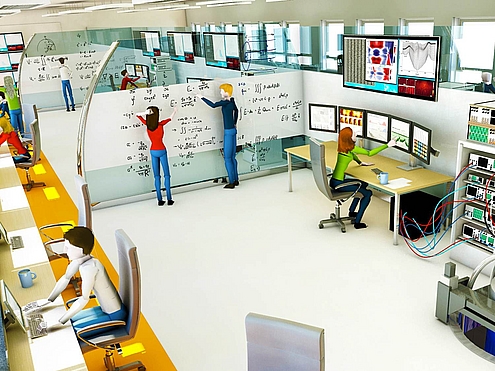Good tidings for quantum computer researchers. A European Synergy Grant worth 15 million euros has been awarded to researchers striving to make the world’s first working quantum computer.
The audacious trio consists of Professors Leo Kouwenhoven and Lieven Vandersypen (both from quantum transport, Applied Sciences, Delft) and Carlo Beenakker (Leiden University). They think the time is ripe to venture a first step towards a working computer application featuring quantumbits on the basis of the recently discovered Majorana fermion.
Other than ordinary computer bits that contain values 0 or 1, quantumbits can have both values at the same time. Theoretically, this would allow multiple sequential calculations to happen simultaneously, making quantum computers eerily fast in solving specific problems.
The practical problem is that quantumbits, which come in a variety of forms, nearly always suffer from ‘decoherence’. This means that a minuet disturbance from their surroundings deranges a qbit’s content, rendering the calculation worthless.
“So how do you take care the quantum state is not disturbed?” says Kouwenhoven on the TU website, explaining that if one qubit in a circuit of perhaps thousands or millions fall into decoherence, the whole quantum calculation will be lost.
“The research in Delft and Leiden has progressed to a point that we are confident that in the next coming years we can build an experimental computer system in which the quantum state is shielded. The recently discovered Majorana particle plays an important role. If it works, we will have the most important building block for the quantum computer in our hands,” says Kouwenhoven.
Pulling together the expertise, Kouwenhoven also takes aboard theoretical physicist Prof. Carlo Beenakker (University Leiden) and Prof. Erik Bakkers (nanowires at TU/Eindhoven). From Delft, Dr Leonardo Di Carlo (error correction in quantum computers), Professor Ronald Hanson (expert in qubits in diamond) and Professor Yuli Nazarov (quantum transport) will also join the quantum computer group.
A ‘large part’ of the 15 million euros will be invested in a new dedicated quantum computer laboratory. Professor Kouwenhoven declined providing further details, fearing ‘over-publication’ of the project.
Press release ERC Synergy Grants



Comments are closed.